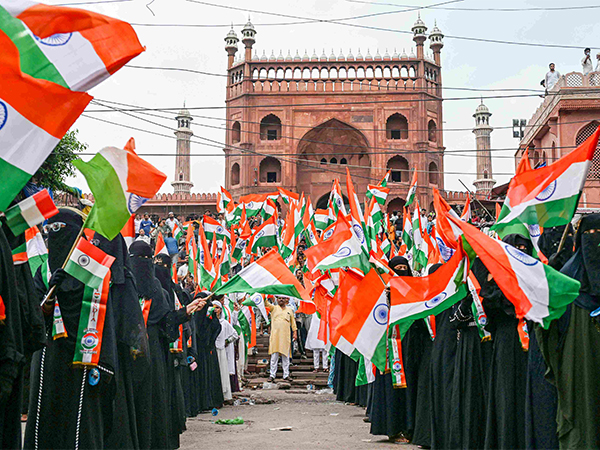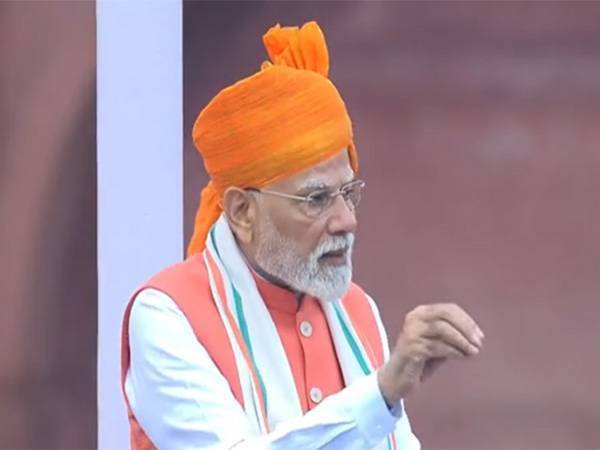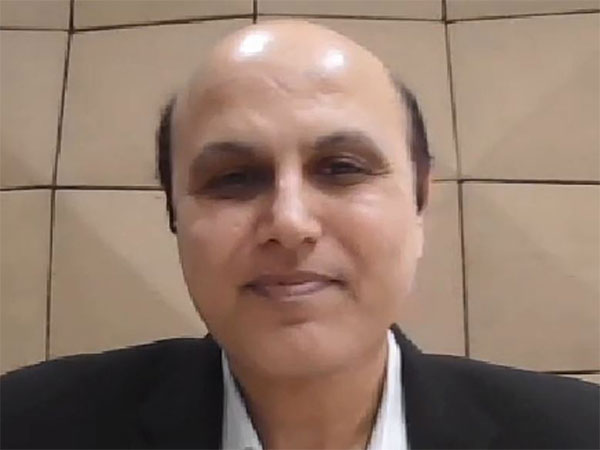By Kavya Dubey
New Delhi [India], August 15 (ANI): At the stroke of the midnight hour, as the world slept, India awoke to “life and freedom” 78 years ago on this day. In the years to come, India’s new-found Independence would significantly impact its association with its neighbouring countries.
Not only was there massive turbulence in the northwest that resulted in the enduring situation with Kashmir as the epicentre of conflict with the newly Independent Pakistan in the west, waves of turmoil had battered eastern India long before Independence redefined the dynamics in that region.
The war with China in 1962 had major bearings on India. Less than two decades after sovereign India awoke to freedom, on August 16, 1964, a fourteen year-old boy from a prominent wealthy family based in Burma (Myanmar), along with his elder brother, had to flee to his homeland in West Bengal with all of 175 kyats (roughly equivalent to Rs 175) in their pocket, while their father remained under house arrest in the neighbouring country in the east.
After the military coup in Burma in 1962, the new dispensation “nationalised everything, making it difficult for Indians to survive there freely”– from Indian children going to schools in Burma to Indians maintaining bank accounts, doing business became difficult. Consequently, they had no option but to leave. Thousands of other Indians in Burma at that time were shipped off to random remote parts of India and were eventually settled there.
Putting down roots afresh
Life “suddenly took a 180-degree turn from lavish living as my father was one of the richest men in northern Shan State,” for Burma-born Dr. Kamal Mazumdar, now 75, settled in Kolkata after retirement from Government of India (GoI) service. “The mental agony and suffering we have faced is difficult to define in few words,” he said, in conversation with ANI.
Giving tuition was a constant part-time engagement for years together thereafter to keep afloat amid dire financial conditions, even after he became an engineer and moved to New Delhi in a humble dwelling. His affluent father was a contractor with the Burmese Army and was close to the dispensation before the coup. Dr. Mazumdar went on to serve as a Technical Advisor in various capacities to GoI under the Ministry of Rural Development’s Drinking Water Mission through the 1990s. For this purpose, he travelled extensively across India and abroad.
On the other side, for Islamabad-based 59-year-old *Fatima Ahmed, visiting her family’s home in Bihar’s Patna during her youth was a cherished experience. Her family had moved to Bangladesh in the ’60s before settling down in Pakistan. However, when she enquired about why her family migrated to Pakistan while some of her close relatives chose to stay back in India, she received no clear response from her elders.
Born and brought up in a family based in Pakistan from both her parents’ sides, Fatima did not relate to the sentiments of displaced people (that her “parents were”). What does India mean to her at this time? “Just like any other country,” she said.
Affinity, opportunity, strategy
Dr Mazumdar pointed out that in Patuli area of Bengal’s Jadavpur, close to the capital Kolkata, where there is a significant concentration of Muslim population, Pakistan’s victory against India in a cricket match is celebrated with great fervour.
“That has more to do with the political environment, given so much rhetoric about that country [Pakistan]. We have to ask ourselves, does that country deserve so much importance?” remarked Delhi-based *Shamshad Khan, 45. “It is not even a rival, look at the sizes of both economies,” he added.
Calling Pakistan an “inalienable part” of our shared history, he stressed that “it is now a separate country and it does not deserve that [importance]–I’m not downgrading that country, but take it normally.”
He likens the situation between India and Pakistan to a divorce: “If one does not move on from it, they will not be able to grow in their life.”
However, in the light of certain glaring events–terror attacks in India backed by Pakistan– Khan acknowledged that India’s attention has been drawn to the western neighbour; but “the country is not so powerful. We are just exhausting ourselves,” he opined.
But, on the eastern side, Dr. Mazumdar observed: “Present day influx of Muslims from Bangladesh and Rohingya from Burma and Bangladesh are backed by Opposition parties, who consider Muslims as their vote banks.”
Colonial hangover
Referring to the second largest religious community in the world that “identifies itself with the faith instead of the country they belong to,” Dr. Mazumdar attributed the spawning of a certain political ideology to the methods of India’s first Prime Minister.
“They [the Opposition parties] still think they will come into power with Muslim votes. Bangladeshis get their Aadhaar cards made at the borders,” he said, as he reiterated that Bangladeshi Muslims concentrated in places like Murshidabad are vote banks of political parties.
But, “the seed was sown in 1905,” he said.
The GoI retiree pointed out that this practice began “before Independence. By 1905, there were many revolutionaries in Bengal while Calcutta [Kolkata] was the bustling hub of economic activities of the British. Lord Curzon [then Viceroy of India] thought that the region would be difficult to manage if not divided.” This led to the Partition of Bengal — largely on grounds of religion.
In 1905, the British Raj carried out a territorial reorganisation of the Bengal Presidency, splitting the region into West Bengal, Assam, and East Bengal (which later became East Pakistan before being liberated as Bangladesh in 1971). Said to be for the purpose of administrative convenience, the territorial reorganisation was perceived as a move to check the momentum of the nationalist movement that was fast picking up in the region.
Khan shed light on the historical context of dividing India along communal lines: “Both Muslim League and Hindu Mahasabha were encouraged by the British. The division was in their interest. They ruled for 200 years, they knew the potential of India, that it will emerge as a huge challenge for the West in future. So, obviously, they wanted to divide the country.”
The ‘secular’ nation
India’s democratic ideal of Secularism intends to separate religion from the affairs of the state. In principle, it seeks to minimise or obliterate the role of religion in public domain.
Khan is of the opinion that “Religion is a personal issue, it should not come out of our homes.” However, instances like Muharram and Kanwariyan processions, which periodically become significant public events, “are heritage,” he said, acknowledging the cultural aspect of religious events in public sphere; “but ek tarika hona chaiya uska (that has to be in a proper way).”
Dr. Mazumdar has a different take on this ideology. Referring once again to India losing a cricket match against Pakistan he questioned: “What secularism are we talking of? No country [other] says they are secular.”
“Ours is the only country that is secular, no other country is. What is secular? It has no meaning,” gushed Dr. Mazumdar, who, a Hindu by birth, was routinely part of Friday prayers in a mosque with a Bangladeshi acquaintance during his stay in Kuwait; and who frequented pagodas in Burma while he studied in a catholic school there that housed a church he visited often; “But now ‘Hindu’ is a political tool,” he remarked.
“So far, secularism, as advocated by many people, is a misconception in India. We are all Indians irrespective of our caste and religion. To me that’s the bottom line,” Dr Mazumdar asserted.
Reclaiming Independence
For Khan, politics ought to be on matters of development, and Independence means: “If I have economic independence and freedom of speech, its enough–in a respectable way, I have the right to share my piece of mind, while the state enables health, education and jobs for citizens.”
In the same spirit, Dr Mazumdar asserted: “Independence ke kuchh usool bhi hain (There are some principles to Independence).”
“Freedom of speech is considered as independence and a democratic right by certain groups of people,” he went on, adding that during his tenure with GoI, he “came across many reputed NGOs funded by foreign governments to propagate and speak against India. Without any source of income these people lived a lavish life. So, freedom of speech, even in democratic countries, needs to be used with caution,” he said.
Further, he pointed out that it is a rarity that a country allows freedom of speech to the extent that India does. “Anyone can get critical of any Chief Minister or even the Prime Minister and President. One can say anything. Very few countries are this sort of liberal,” he observed.
After word
An avid traveller, Dr Mazumdar has explored more than 500 districts in India and visited over 30 countries. From his experience with tribals of Jhabua in Madhya Pradesh who were still clad in leaves and used poisoned arrows and bow for their defence in 1999, to proudly witnessing the revolutionary transition to cashless transactions that has percolated to the grassroots of India, he has a word of advice of young Indians: “Travel the length and breadth of the country to know the diversity and dynamics of India, and interact with local people.”
He added: “Unless a person has travelled to all parts of the country, especially the northeastern states, it is difficult to define Bharat. It is the most unique country in the world.”
“Gaon me jo bastey hai, wahi toh desh hain (those dwelling in villages, they are the country). The country is its people,” he concluded.
(*Names have been changed on request to keep the respondents anonymous) (ANI)
Disclaimer: This story is auto-generated from a syndicated feed of ANI; only the image & headline may have been reworked by News Services Division of World News Network Inc Ltd and Palghar News and Pune News and World News
HINDI, MARATHI, GUJARATI, TAMIL, TELUGU, BENGALI, KANNADA, ORIYA, PUNJABI, URDU, MALAYALAM
For more details and packages
















